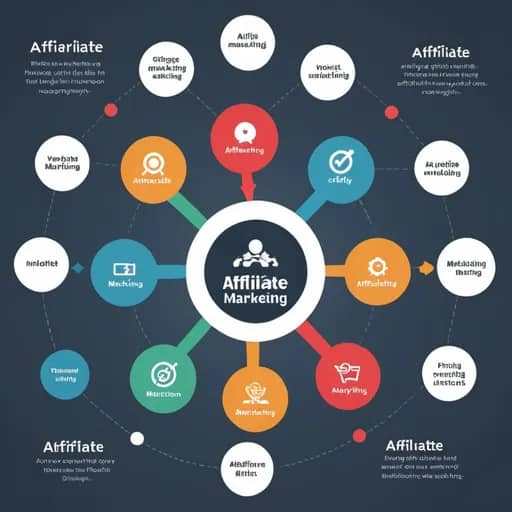TABLE OF CONTENTS
- Definition of affiliate marketing
- Opportunities in Travel Affiliate Marketing
- Key Players in Travel Affiliate Marketing
- Challenges in Travel Affiliate Marketing
- How to Start a Travel Affiliate Marketing Business
- Strategies for Success in Travel Affiliate Marketing
- Case Studies and Examples
- Future Trends and Innovations
- Conclusion
1 Definition Of Affiliate Marketing:

Affiliate marketing is a performance-based marketing strategy where businesses partner with affiliates to promote their products or services. Affiliates, also known as publishers, promote the products or services through various marketing channels such as websites, blogs, social media, email newsletters, and videos. When a visitor clicks on an affiliate link and makes a purchase or completes a desired action (such as signing up for a newsletter or filling out a form), the affiliate earns a commission. The commission structure can vary depending on the agreement between the affiliate and the merchant, and it may be based on a percentage of the sale, a flat fee per conversion, or other metrics. Affiliate marketing is beneficial for both merchants and affiliates: merchants can leverage the marketing efforts of affiliates to reach a wider audience and drive sales, while affiliates can earn passive income by promoting products or services that align with their audience’s interests.
Overview Of The Travel Industry:
The travel industry is a dynamic and diverse sector that encompasses a wide range of businesses and services involved in facilitating travel and tourism. This includes transportation services such as airlines, trains, buses, and rental car companies, accommodation providers such as hotels, resorts, hostels, and vacation rentals, as well as travel agencies, tour operators, attractions, and travel-related services such as travel insurance, currency exchange, and visa assistance. The travel industry caters to various segments of travelers, including leisure travelers, business travelers, adventure seekers, eco-tourists, and luxury travelers. It plays a vital role in global commerce, driving economic growth, job creation, and cultural exchange worldwide. Despite occasional challenges such as economic downturns, natural disasters, and global health crises, the travel industry remains resilient and continues to evolve to meet the changing needs and preferences of travelers.
Importance Of Affiliate Marketing In Travel:
Affiliate marketing plays a crucial role in the travel industry by connecting travelers with relevant products and services, helping them make informed decisions and facilitating their travel experiences. Travel affiliates, such as travel bloggers, influencers, review websites, and comparison sites, serve as valuable sources of information and inspiration for travelers, providing tips, recommendations, reviews, and deals to help them plan and book their trips. By partnering with travel affiliates, travel businesses can tap into their audiences and leverage their influence to drive traffic, bookings, and sales. Affiliate marketing allows travel businesses to reach a wider audience and target specific market segments effectively, resulting in increased brand exposure, customer acquisition, and revenue generation. Additionally, affiliate marketing provides affiliates with opportunities to monetize their content and recommendations, thereby incentivizing them to create high-quality, engaging, and relevant content that resonates with their audience. Overall, affiliate marketing is a cost-effective and performance-driven marketing channel that benefits both travel businesses and affiliates by maximizing reach, engagement, and conversions in the competitive travel market.
II. Opportunities in Travel Affiliate Marketing:
A. Diverse range of products and services:
The travel industry offers a vast array of products and services, catering to the diverse needs and preferences of travelers worldwide. This includes flights, accommodations (hotels, resorts, vacation rentals), transportation (car rentals, train tickets, cruise bookings), tours and activities, travel insurance, travel gear and accessories, and more. This diversity presents a multitude of opportunities for travel affiliates to promote a wide range of products and services to their audience. Affiliates can leverage this diversity to create content tailored to different segments of travelers, such as budget travelers, luxury travelers, family travelers, adventure seekers, and business travelers. By partnering with various travel businesses and affiliate programs, affiliates can monetize their content effectively and provide valuable recommendations and insights to their audience.
B. High demand for travel-related content:
Travel-related content is in high demand among consumers, particularly those who are researching, planning, and booking their trips. According to industry reports, a significant percentage of travelers rely on online sources such as travel blogs, review websites, social media platforms, and travel forums to gather information, read reviews, and seek inspiration for their trips. This presents a lucrative opportunity for travel affiliates to create and share engaging, informative, and visually appealing content that resonates with their audience. Travel affiliates can leverage various content formats such as blog posts, destination guides, travel tips, hotel reviews, travel vlogs, social media posts, and curated travel itineraries to capture the attention of travelers and influence their purchasing decisions. By consistently delivering high-quality and relevant content, travel affiliates can attract and retain a loyal audience and drive traffic to their affiliate partners, resulting in increased conversions and commissions.
C. Global reach and potential for international partnerships:
One of the key advantages of affiliate marketing in the travel industry is its global reach and potential for international partnerships. Travel affiliates have the opportunity to collaborate with travel businesses and affiliate programs from around the world, expanding their reach and earning potential beyond their local market. This allows affiliates to tap into the growing demand for travel-related products and services in emerging markets and popular tourist destinations worldwide. Through strategic partnerships with international airlines, hotel chains, tour operators, and travel agencies, affiliates can access exclusive deals, promotions, and affiliate programs that cater to a global audience. Additionally, travel affiliates can leverage affiliate networks and platforms that facilitate cross-border partnerships and provide access to a diverse range of travel offers and commission structures. By forging international partnerships and diversifying their affiliate portfolio, travel affiliates can maximize their earning potential and capitalize on the global travel market.
D. Flexibility in commission structures:
Another advantage of travel affiliate marketing is the flexibility in commission structures offered by travel businesses and affiliate programs. Unlike traditional advertising models where advertisers pay a fixed fee for ad placements, affiliate marketing allows affiliates to earn commissions based on performance, such as sales, bookings, leads, or clicks. This performance-based model provides affiliates with greater flexibility and control over their earnings, allowing them to optimize their strategies and focus on high-converting offers. Travel affiliates can choose from a variety of commission structures offered by affiliate programs, including percentage-based commissions, flat-rate commissions, tiered commissions, recurring commissions, and hybrid commissions. Additionally, some affiliate programs offer bonuses, incentives, and performance-based rewards to motivate affiliates and encourage them to achieve specific goals and targets. This flexibility in commission structures enables travel affiliates to maximize their earnings potential and adapt to changing market conditions, seasonal trends, and customer preferences. By selecting the most suitable commission structures and negotiating favorable terms with their affiliate partners, travel affiliates can optimize their revenue streams and build a sustainable and profitable affiliate marketing business in the travel industry.

III Key Players In Travel Affiliate Marketing
A. Travel bloggers and influencers:
Travel bloggers and influencers play a significant role in travel affiliate marketing by creating engaging, informative, and inspirational content that resonates with their audience. They often share personal experiences, travel tips, destination guides, hotel reviews, and travel itineraries through various channels such as blogs, social media platforms, YouTube, and podcasts. Travel bloggers and influencers have the ability to influence their followers’ travel decisions and inspire them to explore new destinations, try new experiences, and book travel-related products and services. By partnering with travel businesses and affiliate programs, travel bloggers and influencers can monetize their content through affiliate links, sponsored content, brand collaborations, and affiliate marketing campaigns. They leverage their expertise, authenticity, and storytelling skills to promote travel products and services authentically and drive traffic and conversions for their affiliate partners.
B. Travel agencies and booking platforms:
Travel agencies and booking platforms are key players in travel affiliate marketing, serving as intermediaries between travelers and travel suppliers such as airlines, hotels, tour operators, and car rental companies. These platforms provide travelers with a convenient and centralized platform to research, plan, and book their trips, offering a wide range of travel products and services at competitive prices. Travel agencies and booking platforms leverage affiliate marketing to expand their reach and acquire new customers through partnerships with travel affiliates. They offer affiliate programs that provide affiliates with access to their inventory, booking engines, and commission structures, allowing affiliates to earn commissions for referring bookings and sales. Travel agencies and booking platforms may also provide affiliates with marketing tools, tracking capabilities, and support to optimize their performance and drive conversions. By collaborating with travel agencies and booking platforms, travel affiliates can access a diverse range of travel offers and tap into their established customer base to generate revenue and grow their affiliate business.
C. Destination and accommodation websites:
Destination and accommodation websites are valuable sources of travel information and resources for travelers seeking inspiration, recommendations, and booking options for their trips. These websites provide detailed destination guides, hotel listings, vacation rentals, and travel tips to help travelers plan and book their accommodations. Destination and accommodation websites leverage affiliate marketing to monetize their traffic and earn commissions from bookings and referrals. They partner with travel affiliate programs and hotel booking platforms to integrate affiliate links and booking widgets into their website content, allowing visitors to book accommodations directly through their site. Destination and accommodation websites may also offer curated travel packages, exclusive deals, and promotional offers to incentivize bookings and drive conversions. By collaborating with destination and accommodation websites, travel affiliates can leverage their authoritative content and engaged audience to promote travel-related products and services effectively and earn commissions for successful referrals.
D. Niche travel affiliate programs:
Niche travel affiliate programs cater to specific segments or interests within the travel industry, offering specialized products and services tailored to the needs and preferences of niche audiences. These programs focus on niche markets such as adventure travel, luxury travel, eco-tourism, family travel, solo travel, and budget travel, providing affiliates with targeted offers and commission structures. Niche travel affiliate programs may include tour operators, travel gear brands, travel insurance providers, and specialty accommodations such as boutique hotels and eco-lodges. They offer affiliates access to unique travel experiences, exclusive deals, and promotional materials to help them promote their products and services effectively. Niche travel affiliate programs often have dedicated affiliate managers who provide support, guidance, and resources to help affiliates succeed in promoting their offers. By partnering with niche travel affiliate programs, travel affiliates can tap into specialized markets, target specific audience segments, and differentiate themselves in the competitive travel industry, thereby maximizing their earning potential and building a sustainable affiliate marketing business.

IV. Challenges in Travel Affiliate Marketing
A. High competition in the travel niche:
The travel industry is highly competitive, with a multitude of businesses vying for the attention of travelers and customers. This high level of competition poses a significant challenge for travel affiliates, as they must find ways to differentiate themselves and stand out amidst the sea of travel-related content and offerings. Additionally, established players in the travel niche, such as major airlines, hotel chains, and online booking platforms, often have substantial marketing budgets and resources, making it difficult for smaller affiliates to compete on a level playing field. To overcome this challenge, travel affiliates must focus on carving out a niche, providing unique value propositions, and building strong relationships with their audience. They can differentiate themselves by specializing in specific travel niches, targeting underserved markets, offering exclusive deals or insider tips, and providing personalized recommendations tailored to their audience’s interests and preferences.
B. Dependence on external factors like travel restrictions and economic conditions:
Travel affiliate marketing is inherently dependent on external factors such as travel restrictions, geopolitical events, economic conditions, and natural disasters, which can impact travel demand, consumer behavior, and affiliate earnings. For example, travel restrictions imposed during global health crises, political instability in certain regions, or economic downturns can significantly reduce travel bookings and revenue for travel affiliates. Similarly, fluctuations in exchange rates, fuel prices, and consumer confidence can affect travel spending and purchasing decisions. To mitigate the impact of external factors, travel affiliates must stay informed about market trends, monitor changes in travel policies and regulations, and adapt their strategies accordingly. They can diversify their affiliate portfolio to include a variety of travel products and services, target resilient market segments, and explore alternative revenue streams beyond traditional affiliate marketing, such as sponsored content, digital products, or affiliate partnerships with non-travel brands.
C. Commission rates and cookie durations:
Commission rates and cookie durations are key considerations for travel affiliates, as they directly impact their earning potential and revenue generation. While some travel affiliate programs offer competitive commission rates and generous cookie durations, others may have lower rates or shorter cookie durations, making it challenging for affiliates to earn substantial commissions, especially for high-value bookings such as flights and hotel reservations. Additionally, fluctuations in commission rates and changes to affiliate program terms and conditions can affect affiliate earnings and profitability. To address this challenge, travel affiliates should carefully evaluate the commission structures and cookie durations offered by affiliate programs before joining them, and prioritize partnerships with programs that provide favorable terms and conditions. They can negotiate higher commission rates, exclusive deals, or extended cookie durations with their affiliate partners based on their performance, traffic quality, and audience engagement. Moreover, travel affiliates can diversify their income sources by partnering with multiple affiliate programs, exploring affiliate networks, and exploring alternative monetization strategies such as sponsored content, affiliate partnerships, or digital products.
D. Compliance with regulations and ethical considerations:
Compliance with regulations and ethical considerations is an important aspect of travel affiliate marketing, as affiliates must ensure that their marketing practices are transparent, ethical, and compliant with relevant laws and guidelines. This includes disclosing affiliate relationships, avoiding misleading or deceptive advertising practices, respecting consumer privacy and data protection laws, and adhering to industry standards and best practices. Failure to comply with regulations and ethical guidelines can lead to legal consequences, reputational damage, and loss of trust among consumers and affiliate partners. To address this challenge, travel affiliates should familiarize themselves with relevant laws and regulations governing affiliate marketing, such as the Federal Trade Commission (FTC) guidelines in the United States, the General Data Protection Regulation (GDPR) in the European Union, and the Advertising Standards Authority (ASA) guidelines in the United Kingdom. They should clearly disclose their affiliate relationships and any incentives or compensation received for promoting products or services, and ensure that their marketing materials are accurate, truthful, and not misleading. Additionally, travel affiliates can establish ethical guidelines and best practices for their content creation and promotional activities, and regularly review and update their practices to ensure compliance with evolving regulations and industry standards.

V. How To Start A Travel Affiliate Marketing Business
A. Choose a niche within the travel industry:
When starting a travel affiliate marketing business, it’s essential to choose a specific niche within the vast travel industry. Narrowing down your focus allows you to target a specific audience and establish yourself as an authority in that niche. Consider factors such as your interests, expertise, and the potential demand for your chosen niche. Examples of travel niches include adventure travel, luxury travel, budget travel, family travel, solo travel, eco-tourism, and cultural travel. Conduct market research to identify underserved or emerging niches and evaluate the competition to determine the viability of your chosen niche.
B. Research affiliate programs and networks:
Once you’ve chosen your niche, research affiliate programs and networks that offer products and services relevant to your audience. Look for reputable affiliate programs with a track record of reliability, timely payments, and competitive commission rates. Consider factors such as the range of products and services offered, commission structures, payment methods, cookie durations, and affiliate support. Join multiple affiliate programs to diversify your revenue streams and maximize your earning potential. Popular travel affiliate networks include Booking.com Affiliate Partner Program, Expedia Affiliate Program, TripAdvisor Affiliate Program, and Amazon Associates.
C. Build a website or blog with quality content:
Establishing a professional website or blog is essential for building your brand, attracting visitors, and generating affiliate sales. Choose a domain name and hosting provider that reflects your niche and brand identity. Design a user-friendly website with a clean layout, intuitive navigation, and mobile responsiveness. Create high-quality content that provides value to your audience and addresses their needs, interests, and pain points. Publish a mix of informative articles, destination guides, travel tips, product reviews, and personal experiences to engage your audience and encourage them to explore your site further. Optimize your content for search engines (SEO) to improve your visibility and attract organic traffic from search engine results pages (SERPs).
D. Drive traffic to your site through SEO, social media, and other channels:
Once your website is live, focus on driving traffic to your site through various marketing channels. Implement search engine optimization (SEO) strategies to improve your website’s ranking in search engine results and attract organic traffic. Optimize your website’s on-page elements, such as meta tags, headings, and content, and build quality backlinks from reputable websites to improve your site’s authority and credibility. Leverage social media platforms such as Instagram, Facebook, Twitter, and Pinterest to promote your content, engage with your audience, and drive traffic to your site. Utilize email marketing, content marketing, guest blogging, influencer collaborations, and online communities to expand your reach and attract targeted traffic to your site.
E. Monetize your traffic with affiliate links and partnerships:
Once you’ve established a steady flow of traffic to your site, monetize your traffic by strategically placing affiliate links and banners within your content. Promote relevant products and services that align with your audience’s interests and needs, and provide value to your audience by recommending products or services that you genuinely believe in. Disclose your affiliate relationships transparently to build trust with your audience and comply with legal and ethical guidelines. Explore opportunities for affiliate partnerships, sponsorships, and collaborations with travel brands, tour operators, hotels, and other businesses in your niche to diversify your revenue streams and maximize your earning potential.
F. Recommended online digital skills schools for training:
To enhance your knowledge and skills in affiliate marketing, digital marketing, and travel blogging, consider enrolling in online digital skills schools and courses offered by reputable platforms such as Happy face Academy, Udemy, Coursera, Skillshare, HubSpot Academy, and Google Digital Garage. These platforms offer a wide range of courses, tutorials, and resources on topics such as affiliate marketing strategies, content creation, search engine optimization (SEO), social media marketing, email marketing, analytics, and more. Invest in your education and continuously update your skills to stay ahead of the curve and succeed in the competitive world of travel affiliate marketing.
VI. Strategies for Success In Travel Affiliate Marketing
A. Niche targeting and audience segmentation:
Niche targeting and audience segmentation are essential strategies for success in travel affiliate marketing. By identifying a specific niche within the travel industry and understanding the needs, preferences, and behaviors of your target audience, you can tailor your marketing efforts to resonate with your audience effectively. Conduct market research to identify underserved or emerging niches, and create targeted content that addresses the unique interests and pain points of your audience. Segment your audience based on demographics, interests, location, and behavior to deliver personalized recommendations and offers that are relevant and compelling to each segment. By focusing on niche targeting and audience segmentation, you can attract qualified leads, increase engagement, and improve conversion rates.
B. Content optimization for search engines and user engagement:
Content optimization is key to driving traffic and engagement to your travel affiliate website or blog. Optimize your content for search engines (SEO) by incorporating relevant keywords, meta tags, and headings, and optimizing your site’s loading speed, mobile responsiveness, and user experience. Create high-quality, informative, and engaging content that provides value to your audience and encourages them to explore your site further. Use a mix of text, images, videos, and interactive elements to keep your audience engaged and interested. Incorporate calls-to-action (CTAs) strategically to encourage users to take desired actions, such as booking a hotel, signing up for a newsletter, or following you on social media. By optimizing your content for search engines and user engagement, you can improve your site’s visibility, attract organic traffic, and increase conversions.
C. Building strong relationships with affiliate partners:
Building strong relationships with affiliate partners is crucial for success in travel affiliate marketing. Cultivate relationships with reputable travel brands, tour operators, hotels, and other businesses in your niche by demonstrating professionalism, reliability, and integrity. Communicate effectively with your affiliate partners, and provide them with timely updates, feedback, and performance reports to demonstrate the value of your partnership. Collaborate on co-branded content, promotional campaigns, and exclusive offers to maximize your mutual success. Be proactive in seeking out new partnership opportunities and exploring ways to add value to your affiliate partners’ businesses. By building strong relationships with affiliate partners, you can gain access to exclusive deals, increase your earning potential, and differentiate yourself in the competitive travel market.
D. Diversifying revenue streams beyond affiliate marketing:
While affiliate marketing is a valuable revenue stream for travel affiliates, diversifying your income sources can help mitigate risk and increase your overall profitability. Explore opportunities to monetize your audience through alternative revenue streams such as sponsored content, digital products, advertising, consulting services, and affiliate partnerships with non-travel brands. Develop additional income streams that complement your affiliate marketing efforts and provide value to your audience. For example, you could create and sell e-books, online courses, or travel guides related to your niche, offer consulting services or personalized travel planning services, or collaborate with brands on sponsored content or brand ambassadorship opportunities. By diversifying your revenue streams, you can create a more stable and sustainable income stream and reduce your reliance on any single source of revenue.
VII. Case Studies And Examples
A. Successful travel affiliate marketing campaigns:
Showcase successful travel affiliate marketing campaigns that have achieved notable results, such as increased traffic, engagement, and conversions. Highlight innovative strategies, creative content, and effective partnerships that contributed to the success of these campaigns. Provide insights into key metrics, performance indicators, and lessons learned from these campaigns to inspire and educate other travel affiliates.
B. Notable affiliate partnerships in the travel industry:
Highlight notable affiliate partnerships within the travel industry, showcasing successful collaborations between travel affiliates and travel brands, tour operators, hotels, and other businesses. Showcase examples of mutually beneficial partnerships that have resulted in increased exposure, revenue, and brand awareness for both parties. Explore the strategies and tactics used to establish and nurture these partnerships, and provide insights into the key factors that contributed to their success.
C. Lessons learned from both successes and failures:
Reflect on lessons learned from both successful and unsuccessful travel affiliate marketing campaigns and partnerships. Analyze the factors that contributed to the success or failure of these initiatives, such as market conditions, consumer behavior, competition, and execution. Extract actionable insights, best practices, and practical tips that travel affiliates can apply to their own strategies and campaigns. Encourage readers to learn from past experiences, experiment with new approaches, and continuously iterate and optimize their affiliate marketing efforts for long-term success.
VIII. Future Trends and Innovations
A. Emerging technologies shaping travel affiliate marketing:
The future of travel affiliate marketing will be heavily influenced by emerging technologies that enhance user experiences, streamline processes, and drive innovation. Artificial intelligence (AI) and machine learning algorithms will play a significant role in personalizing recommendations, optimizing pricing strategies, and automating customer interactions. Virtual reality (VR) and augmented reality (AR) technologies will enable immersive travel experiences, allowing users to explore destinations, hotels, and attractions virtually before making a booking. Voice search and natural language processing (NLP) will revolutionize how travelers search for and book travel products and services, with voice-activated assistants and chatbots providing instant assistance and recommendations. Blockchain technology will improve transparency, security, and trust in travel transactions, enabling faster and more secure payments, loyalty programs, and identity verification. Additionally, the Internet of Things (IoT) will connect smart devices and sensors to create seamless travel experiences, from smart luggage and hotel rooms to connected transportation and destination services.
B. Predictions for the evolution of the industry:
The travel industry is poised for continued evolution and transformation in the coming years, driven by changing consumer behaviors, technological advancements, and global trends. As travel restrictions ease and consumer confidence rebounds post-pandemic, there will be a resurgence in travel demand, with a focus on sustainable, experiential, and wellness-focused travel experiences. The rise of digital nomadism and remote work will fuel demand for longer-term stays, alternative accommodations, and digital nomad-friendly destinations. The sharing economy will continue to disrupt traditional travel sectors, with platforms like Airbnb and Uber expanding their offerings and market presence. Destination marketing organizations (DMOs) and tourism boards will leverage data-driven insights and destination management technologies to optimize visitor experiences, manage overtourism, and promote sustainable tourism practices. The rise of Gen Z travelers will reshape travel preferences and expectations, with a focus on authenticity, social responsibility, and immersive experiences. Overall, the travel industry will continue to adapt and innovate to meet the evolving needs and preferences of travelers in a rapidly changing landscape.
C. Opportunities for innovation and growth:
Despite the challenges and uncertainties facing the travel industry, there are ample opportunities for innovation and growth in travel affiliate marketing. Travel affiliates can leverage emerging technologies, such as AI, VR, AR, and IoT, to create immersive and personalized travel experiences that resonate with their audience. They can explore new niches and markets, such as wellness travel, sustainable travel, and digital nomadism, to cater to evolving consumer preferences and trends. Partnerships with non-travel brands, such as lifestyle, fitness, and technology brands, offer opportunities to diversify revenue streams and reach new audiences. Content formats such as video, live streaming, and interactive content will continue to gain traction, offering new ways to engage and inspire travelers. Additionally, travel affiliates can embrace data analytics and performance tracking tools to measure and optimize their marketing efforts, identify emerging trends, and capitalize on opportunities in real-time.
IX. Conclusion
B. Final thoughts on the outlook for travel affiliate marketing:
In conclusion, the outlook for travel affiliate marketing is promising, with continued growth, innovation, and opportunities on the horizon. While the travel industry faces challenges such as competition, external factors, and regulatory compliance, there are also significant opportunities for travel affiliates to thrive and succeed in a dynamic and evolving landscape. By staying informed, adaptable, and innovative, travel affiliates can position themselves for long-term success and capitalize on emerging trends and technologies to create value for their audience and affiliate partners.
C. Call to action for readers interested in entering the space or optimizing their current strategies:
For readers interested in entering the travel affiliate marketing space or optimizing their current strategies, now is the time to take action. Invest in your education and skills development by exploring online courses and resources on affiliate marketing, digital marketing, and travel blogging. Conduct market research to identify profitable niches, affiliate programs, and partnership opportunities within the travel industry. Build a professional website or blog with quality content that resonates with your audience and provides value. Leverage emerging technologies, data analytics, and performance tracking tools to optimize your marketing efforts and stay ahead of the curve. Cultivate strong relationships with affiliate partners, brands, and industry stakeholders to maximize your earning potential and growth opportunities. Remember that success in travel affiliate marketing requires dedication, perseverance, and continuous learning, but the rewards can be significant for those who are willing to put in the effort and seize the opportunities available.
RELATED Topics To Travel Affiliate Marketing:
Mastering Affiliate Marketing: A Comprehensive Guide for Beginners.
Affiliate Marketing Tools and Resources.
SEO for Affiliate Marketers: Rank Higher, Earn More.
Building Your Brand As A Travel Content Creator: Strategies for Succed
Launch Your Global Career: A Step-By-Step
Resources:
Subscribe www.happyfacelimited.com
Learn Affiliate Marketing plus Free Travel programs
Become happy Face Travel Affiliate



